Key takeaways:
- Ethical parenting involves aligning values with actions, encouraging open dialogue, and fostering mutual respect.
- Pro-life advocacy emphasizes empathy and community support, focusing on protecting life while assisting women in crisis.
- Fostering value systems in children prepares them to navigate life’s complexities and strengthens their sense of responsibility.
- Creating a supportive environment through communication, family traditions, and experiences reinforces ethical values and confidence in children.
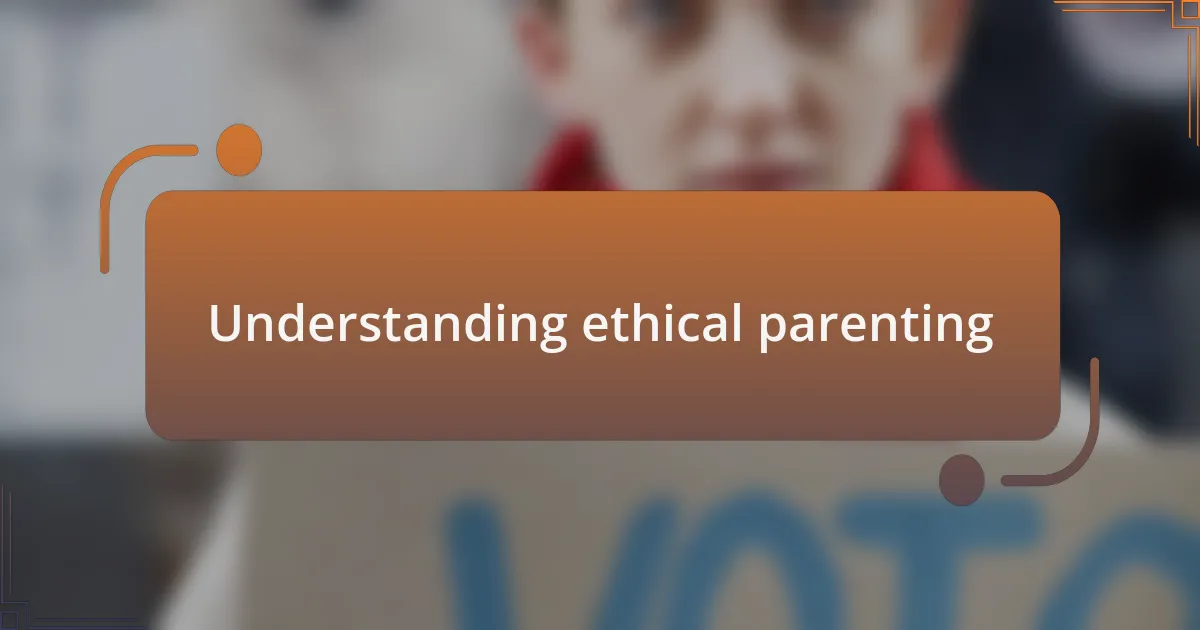
Understanding ethical parenting
Understanding ethical parenting goes beyond merely following a set of rules; it’s about aligning my values with my daily actions. When I reflect on my own parenting journey, I realize that every choice I make is rooted in a desire to nurture compassion and integrity within my children. I often ask myself, how do my decisions shape the individuals they will become?
I remember a time when my child confronted me about the complexities of right and wrong in a story we recently read together. This moment reminded me that ethical parenting requires open dialogue. I strive to cultivate an environment where questions are encouraged, allowing my children to think critically about their actions and the world around them. Isn’t it fascinating how these conversations can spark deep insights?
Furthermore, ethical parenting necessitates consistency. I’ve found that when I hold myself accountable to the same standards I expect from my kids, it fosters mutual respect and trust. It’s a dynamic dance of learning and growing together, isn’t it? By sharing my values transparently, I hope to instill a strong ethical foundation that guides them through life’s trials.
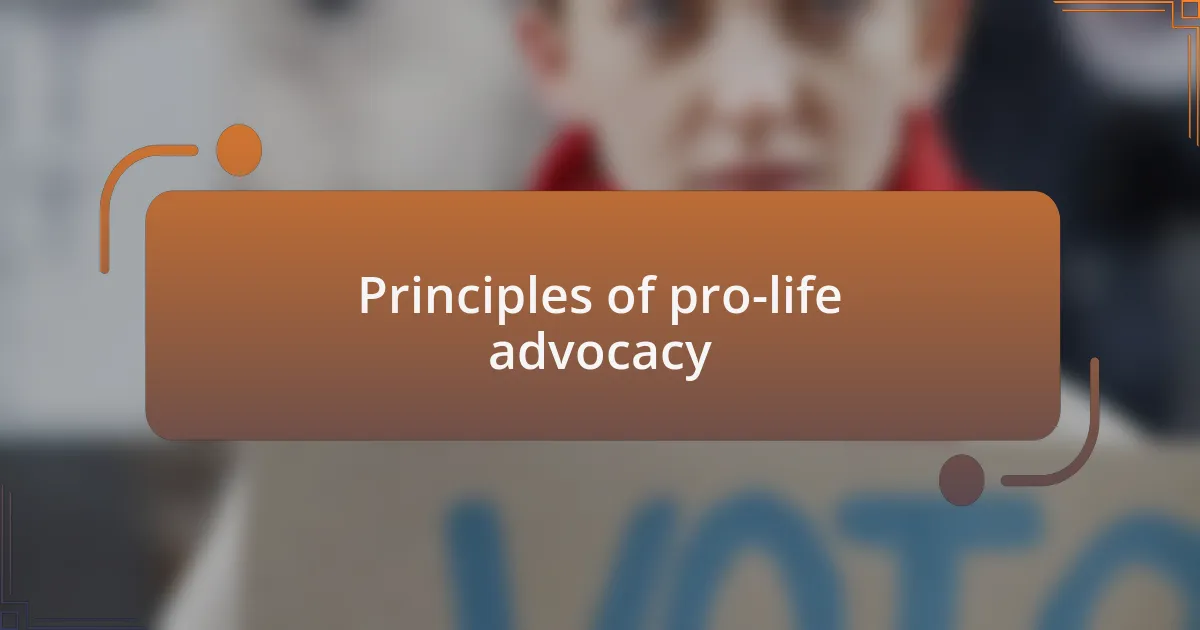
Principles of pro-life advocacy
The principles of pro-life advocacy are deeply rooted in the belief that every life has intrinsic value and should be protected. From my perspective, this involves not just opposing abortion, but also supporting women through education, healthcare, and social services. I remember speaking with a friend who was pregnant and in crisis; rather than just voicing opposition, I was able to provide her with resources and a listening ear, which opened the door for meaningful dialogue about choice and consequence.
Moreover, a fundamental principle is understanding the importance of empathy in our advocacy. It’s crucial to recognize that women facing unplanned pregnancies often experience a range of emotions, from fear to uncertainty. I often think about the stories I have heard from women who felt abandoned during this vulnerable time. This motivates me to advocate not just for the unborn but for the support systems that empower women to choose life with confidence.
Lastly, the principle of community involvement is vital. Effective pro-life advocacy thrives when individuals come together, sharing knowledge and resources. In my experience, attending local gatherings where we connected with community members sparked not only enthusiasm but also a deeper understanding of the issues at hand. How can we cultivate a culture that values life if we don’t engage actively in our neighborhoods? This collective commitment can truly transform perspectives and foster a culture that cherishes every human life.
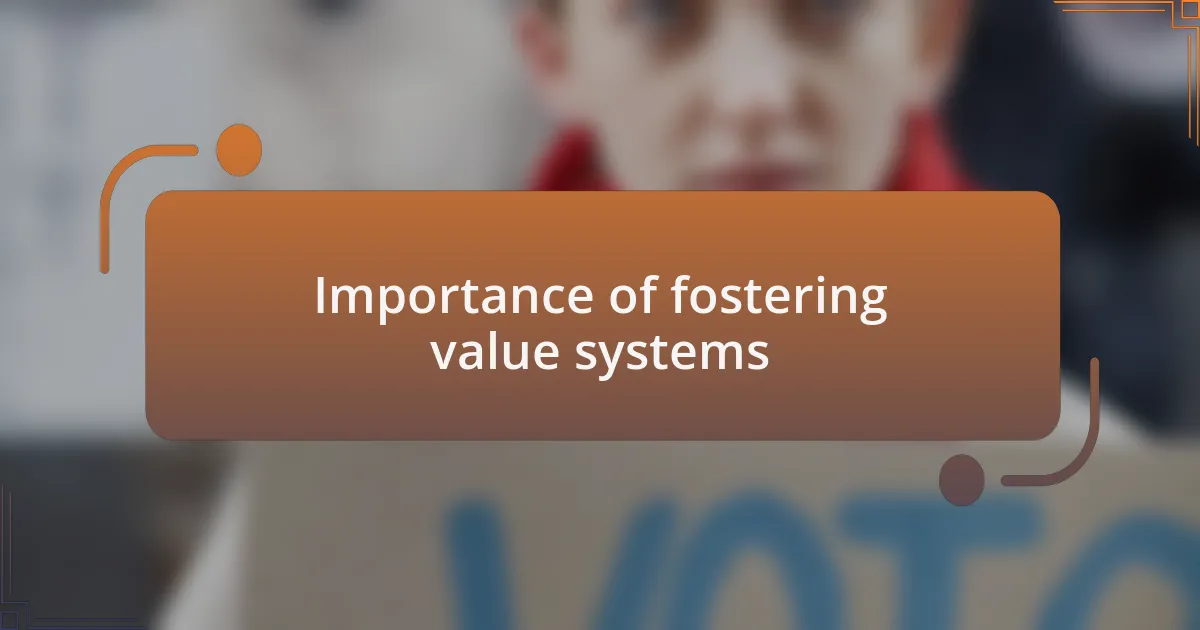
Importance of fostering value systems
Fostering value systems is essential in shaping ethical parenting, as these values guide children’s understanding of right and wrong. I recall a time when my child faced a moral dilemma at school. Instead of simply telling them what to do, I encouraged a discussion about our family values. That moment not only helped them make the right choice but also reinforced the importance of living by those principles.
Additionally, when we instill strong value systems, we prepare our children to navigate the complexities of life with confidence. I remember watching my niece face peer pressure about relationships. Because her parents emphasized respect and empathy at home, she was able to firmly stand her ground. Isn’t it heartening to witness children who can articulate their beliefs and stand up for themselves?
Moreover, fostering values cultivates a sense of community and responsibility. During a local charity drive, my family volunteered together, emphasizing the value of helping others. That experience ingrained in my children the understanding that our actions impact those around us. How powerful is it when children learn that compassion and service are not just ideals, but essential parts of who they are?
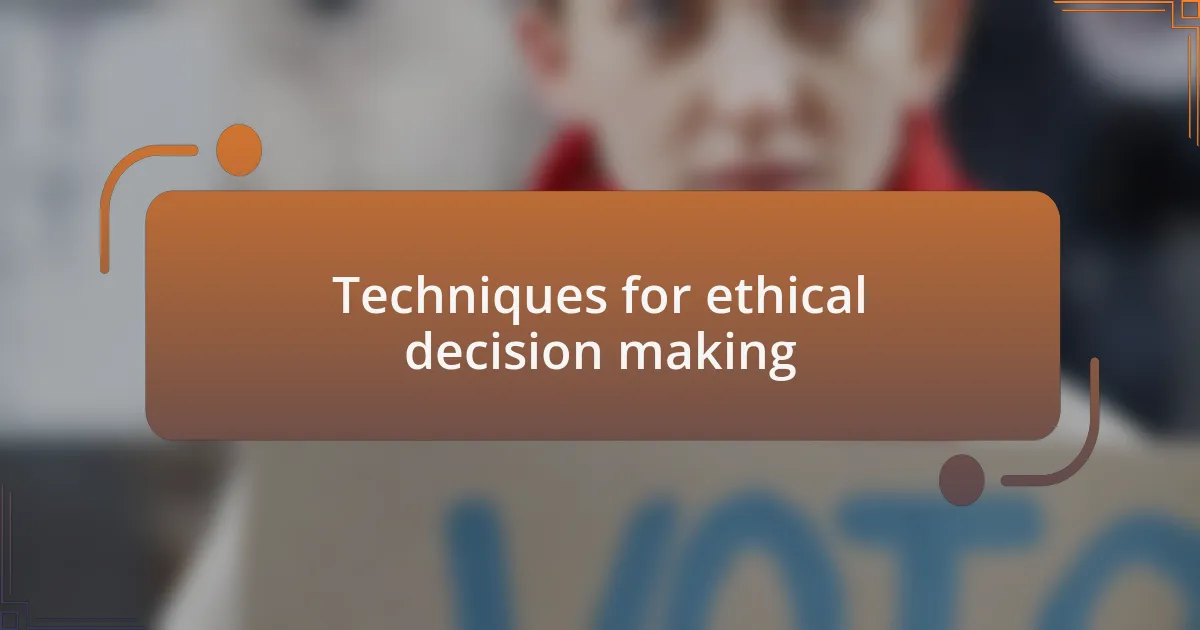
Techniques for ethical decision making
One technique I find effective for ethical decision-making is considering the long-term consequences of each choice. When my son was deciding whether to join a friend who was misbehaving, I asked him to think about how that choice might affect his reputation and relationships down the line. It was fascinating to watch his thought process unfold as he began to see that immediate satisfaction might lead to future regret. Have you ever pondered how a single decision might echo through someone’s life?
Another approach I rely on is role-playing different scenarios. I once simulated a situation with my daughter where she could either help a friend in need or ignore them for her benefit. Engaging her in this way not only strengthened her empathy but also helped her recognize the emotional weight of her decisions. This technique makes discussions about ethics more dynamic and memorable, don’t you think?
Finally, I believe in the importance of seeking diverse perspectives when faced with moral dilemmas. A family discussion about a recent news event sparked a debate where everyone shared their views. I cherished how my children learned to appreciate differing opinions and the reasoning behind them. How amazing is it to see young minds develop critical thinking by engaging with varied perspectives?
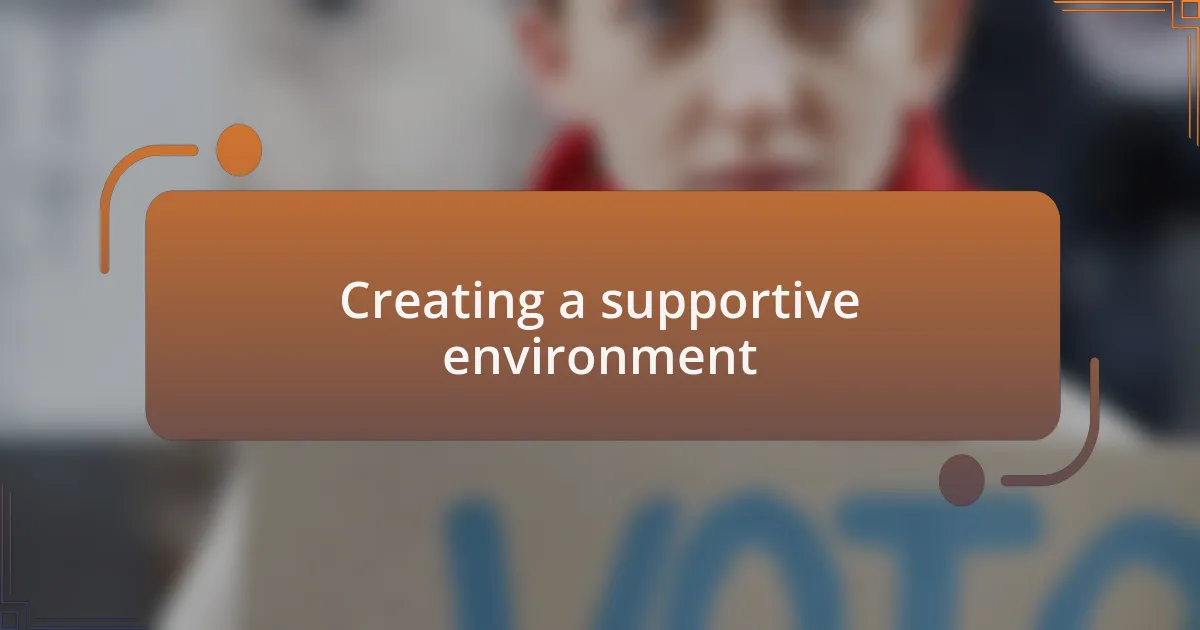
Creating a supportive environment
Creating a supportive environment is essential for nurturing ethical values in our children. I remember a time when my daughter faced bullying at school. Rather than simply telling her to ignore it, we transformed our living room into a safe space where she could share her feelings openly. It was during those heartfelt discussions that she learned to build her confidence and develop the strength to stand up for herself and others. Have you ever created a similar space where your child could be vulnerable?
Another way I foster a supportive environment is through family traditions that emphasize kindness and compassion. For example, each month, we dedicate a weekend to community service, whether it’s helping at a local shelter or organizing a neighborhood cleanup. These hands-on experiences allow my kids to see the real impact of their actions while reinforcing the importance of giving back. Isn’t it inspiring to watch children actively engage in making the world a kinder place?
Finally, I prioritize open lines of communication to ensure my children feel heard and validated. On those evenings when they come home burdened by the weight of their day, I make it a point to put aside my distractions and genuinely listen. This practice not only strengthens our bond but also teaches them that their feelings matter. Don’t you think that having a compassionate ear can significantly shape the way children view themselves and the world around them?
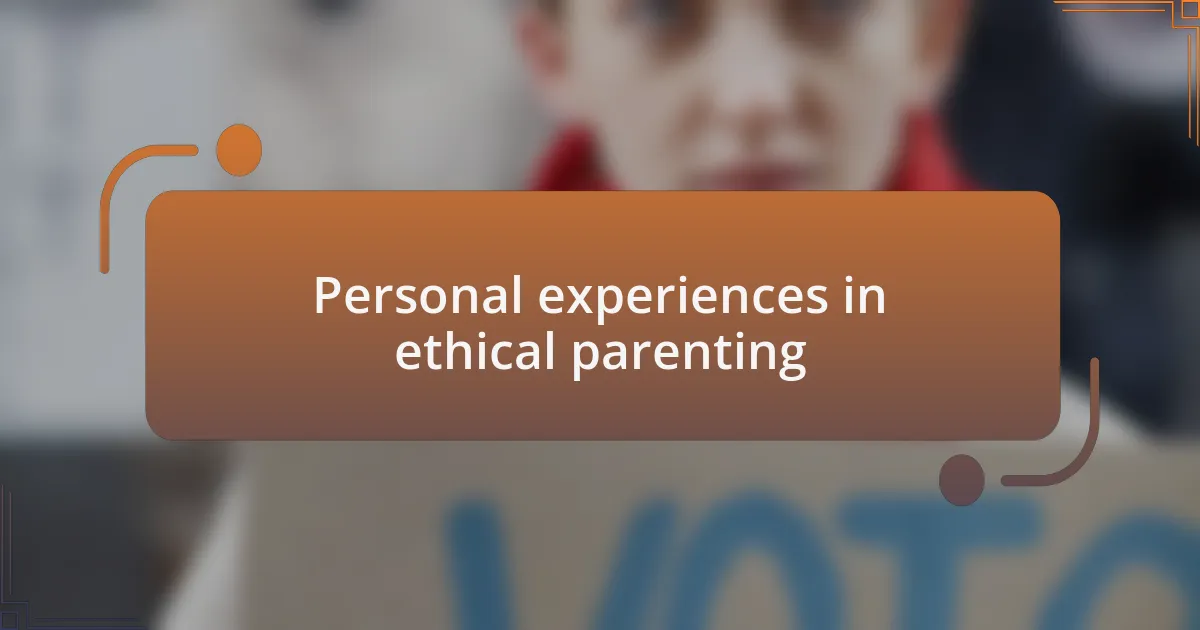
Personal experiences in ethical parenting
When it comes to ethical parenting, I’ve found that leading by example is crucial. One afternoon, I took my son to a farmers’ market and encouraged him to ask questions about the produce. Watching him interact with the farmers made me realize how important it is for children to learn about conscious consumerism firsthand. In those moments, he began understanding the value of supporting local businesses and making informed choices. Have you seen your child light up while learning about something in a hands-on manner?
Another experience that stands out to me is the time I introduced my daughter to a book club with her friends focused on diverse stories and perspectives. As they discussed complex topics, I could sense their growing empathy and understanding of different cultures and experiences. Observing their excitement as they shared these discussions with me was a reminder of how crucial it is to equip our children with a broader worldview. Isn’t it rewarding to witness such a shift in their understanding of what it means to be a responsible global citizen?
In moments of disagreement, I emphasize the importance of respect and understanding differing viewpoints. Once, during a heated debate at the dinner table about a political issue, I encouraged my kids to express their opinions while also recognizing others’ right to disagree. This ease of expression helped us navigate tough conversations as a family. Did you experience a moment where discussing difficult topics brought your family closer together?
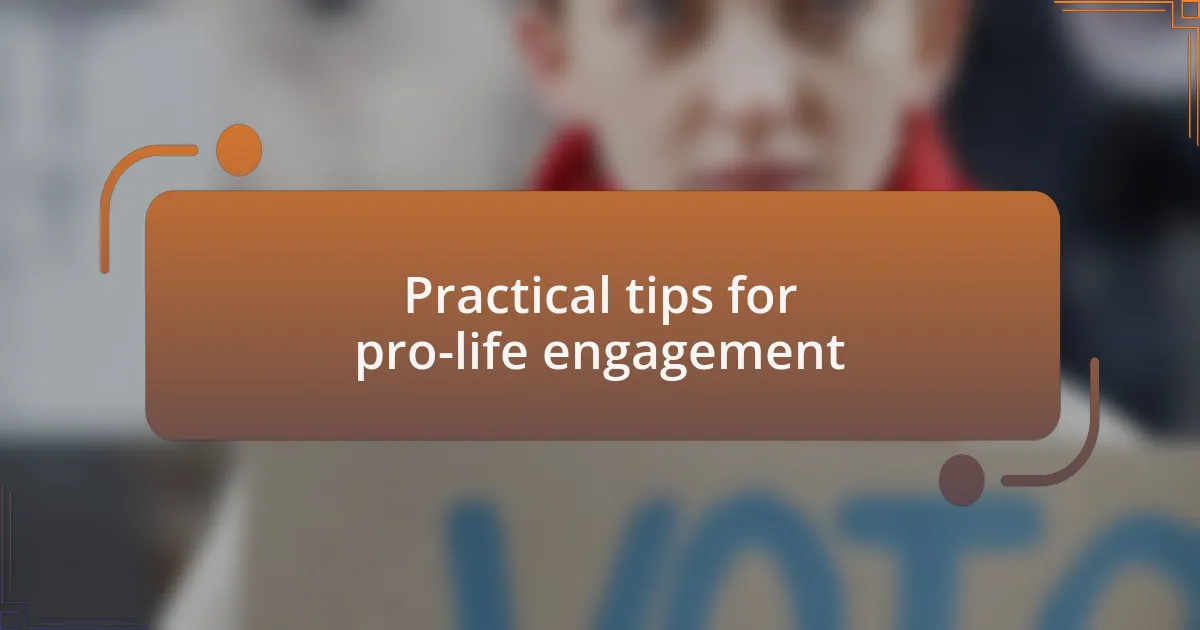
Practical tips for pro-life engagement
One practical tip for pro-life engagement is to participate in community events that align with these values. I recall joining a local pro-life march and feeling a sense of unity that was both uplifting and empowering. Have you ever felt that rush of purpose when standing alongside like-minded individuals? It’s truly a reminder of the collective strength we can harness when we come together for a cause we believe in.
Another effective strategy is to foster open conversations about pro-life beliefs at home. I remember hosting a discussion night with friends where we shared personal stories that shaped our views. It was fascinating to see how much deeper our understanding became through these exchanges. Don’t you find that sharing personal narratives can bridge gaps in understanding and create a supportive atmosphere for dialogue?
Additionally, volunteering for pro-life organizations can be both fulfilling and informative. I once spent a weekend at a local pregnancy resource center, which not only allowed me to contribute but also taught me so much about the challenges faced by expecting mothers. What better way to engage than to directly offer support and learn about the real impact of our activism? It’s experiences like these that add depth to our commitment and inspire further action.